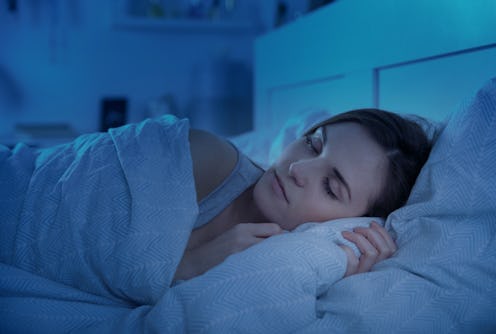While forgoing sleep in favor of plowing forward was once a badge of honor, the Better Sleep Council has declared that sleep is the new status symbol. What's more, they offer tips for ways to sleep faster by preparing your five senses for the actual act of sleeping, because there's more to a getting a good night's rest than simply lying down in your bed. If you have #SleepGoals, but that sweet slumber continues to allude you, there are some things you can do to increase your chances of successfully slipping off to dreamland.
"Gone are the days of touting just how little you snooze. Bragging about your skills in bed — as they relate to sleep, of course — is all the rage. Sure, at the Better Sleep Council (BSC), we’ve always been on this trend. And we know that getting [seven-to-eight] hours of sleep each night has a long list of benefits," the BSC wrote in a blog post for Better Sleep Month. With today's go-go-go lifestyle, myriad distractions, and a lot of screen time, calming your five sense — sight, sound, smell, touch, and taste — before bed is more difficult than ever before, which is why it's important to have a solid pre-bedtime routine. If you're not sure where to start, these are just a few things you can do to ensure you get quality sack time.
1Sight: Darkness Is Your Friend
The BSC recommends that you sleep in a dark room. If your bedroom has a lot of windows, invest in blackout curtains or a good sleep mask because light can be a pretty big deterrent to getting quality sleep. The National Sleep Foundation also offers tips for making your bedroom a cozy cave that's conducive to sleep. "Consider low-wattage, incandescent lamps at your bedside to help you wind down in the hours before sleep," the NSF wrote on its blog. "Survey your room for any other sources of artificial light, for example, street lamps or porch lights, or even the glow from the power buttons of electronics like TV's or bright alarm clocks. Consider blocking these to make the room completely dark while you sleep. If you go to the bathroom during the night, do so by nightlight, instead of turning on stronger overhead lights."
2Sound: Block Out External Noise
Noise is one of the biggest barriers to getting a good night's sleep. This is because while you asleep your brain still continues to process sounds, according to the NSF. "Noise can jostle your slumber — causing you to wake, move, shift between stages of sleep, or experience a change in heart rate and blood pressure — so briefly that you don't remember the next morning." And, even if you don't realize it, those small disturbances can leave you tired and sluggish, even after eight hours in bed. The BSC recommends using earplugs, or listening to soft meditation music. You can also use a fan, or a white noise app to increase your chances of blocking out external noise.
3Smell: Love Yourself Some Lavender
If you think aromatherapy is just new age mumbo jumbo, the scent of lavender can actually help prepare you for sleep. "Lavender has been shown to decrease heart rate and blood pressure, potentially putting you in a more relaxed state," the NSF noted. "In one study, researchers monitored the brain waves of subjects at night and found that those who sniffed lavender before bed had more deep sleep and felt more vigorous in the morning." You can spray lavender on your pillow, or use it in an oil diffuser.
4Touch: Opt For Soothing Fabrics
Believe it or not, what you sleep in and on matters. If you sleep in your birthday suit, make sure your sheets are made of cotton or bamboo because these fabrics draw moisture away from your body. If you like to bundle up for bed, cotton and bamboo pajamas are also ideal choices. "For pajamas and sheets, it may help to choose a breathable cotton fabric so that you don't overheat," the NSF recommended. "There are newer fabrics available that also have the ability to wick away moisture — especially helpful if you sweat when you sleep."
5Taste: Have A Cuppa Tea
Before you turn in for the night, consider making yourself a soothing cup of herbal tea. If tea is not your jam, any warm, caffeine-free drink can help reduce stress before bedtime. Creative Consultant Matilda Goad shared her own nighttime recipe with the New York Times, and noted that it's more than just the drink that promotes relaxation. "It switches me into a different mentality. You’re certainly not going to reply to an email after you’ve drunk this." Basically, having a warm drink before bed alerts your brain that you're transitioning into the relaxing part of your day.
6Breathe & Stretch Before Bed
The BSC recommends relaxing your muscles and joints before bed by practicing Yoga Nidra, which brings both the body and mind into a restful state. If you don't want to get into a full-on yoga routine before bed, do a little stretching or some deep breathing exercises to help release any tension you may be holding onto after a busy day.
7Make Your Bedroom A Tech-Free Zone
Even if you follow recommendations one through six, if you're bringing your electronics to bed it's all for naught because your phone, computer, and tablet emit a type of light that's extremely disruptive to sleep. The BSC recommends moving your cellphone out of arm's reach so you'll be less likely to scroll through social media when you can't sleep. Additionally, power down your devices at least an hour before bed and opt for reading a real book or meditating instead. If you're serious about sleep, creating your own bedtime ritual can help increase your chances of sleeping more deeply more often. And, who doesn't want that? Because, #SleepGoals.
